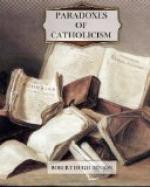The Truth, then, makes us free. The State which controls men’s actions and educates their intellects, which, in a word, enforces the knowledge of truth and compels obedience to it, is actually freeing its citizens by that process. It is only by a misuse of words or a failure to grasp ideas that I can maintain that an ignorant savage is more free than an educated man. It is true that I am, in a sense, “free” to think that two and two make five, if I have not learned arithmetic; on the other hand, when I learn that they make four I rise into that higher and more real liberty which a knowledge of arithmetic bestows. I am more effective, not less so; I am more free to exercise my powers and use the forces of the world in which I live, and not less free, when I have submitted my intellect to facts.
III. (i) Now the soul too has an environment. Men may differ as to its nature and its conditions, but all who believe in the soul at all believe also that it has an environment, and that this environment is as much in the realm of Law as is the natural world itself. Prayer, for example, elevates the soul, base thinking degrades it.
Now the laws of this environment were true even before Christ came. David knew, at any rate, something of penitence and of the guilt of sin, and Nathan knew something, at least, of the forgiveness of sins and of their temporal punishment. Christ came, then, with this object amongst others: that He might reveal the laws of Grace and convey to men’s minds some at least of the facts of the spiritual life amongst which they lived. He came, moreover, partly to modify the workings of these laws, to release some more fully, and to restrain others; in a word, to be the Revealer of Truth and the Administrator of Grace.
He came then, to increase men’s liberty by increasing their knowledge, as, in another sphere, the scientist comes to us with the same purpose. Here, for example, is the law that murder is a sin before God and brings its consequences with it, a law stated briefly in the commandment Thou shall not kill. But our Divine Lord revealed more of the workings of this law than men had hitherto recognized. I say unto you, declared Christ, that whosoever hateth his brother is a murderer. He revealed, that is to say, the fact that this law runs even in the realm of thought, that the hating spirit incurs the guilt and punishment of murder, and not merely the murderous action. Were men less free when they learned that fact? Not unless I am less free than I was before, when I learn for the first time that lightning kills. Christ came, then, to reveal the Truth that makes us free, and He does so by informing our intellects and enabling us to bring into captivity every understanding to His obedience_.




